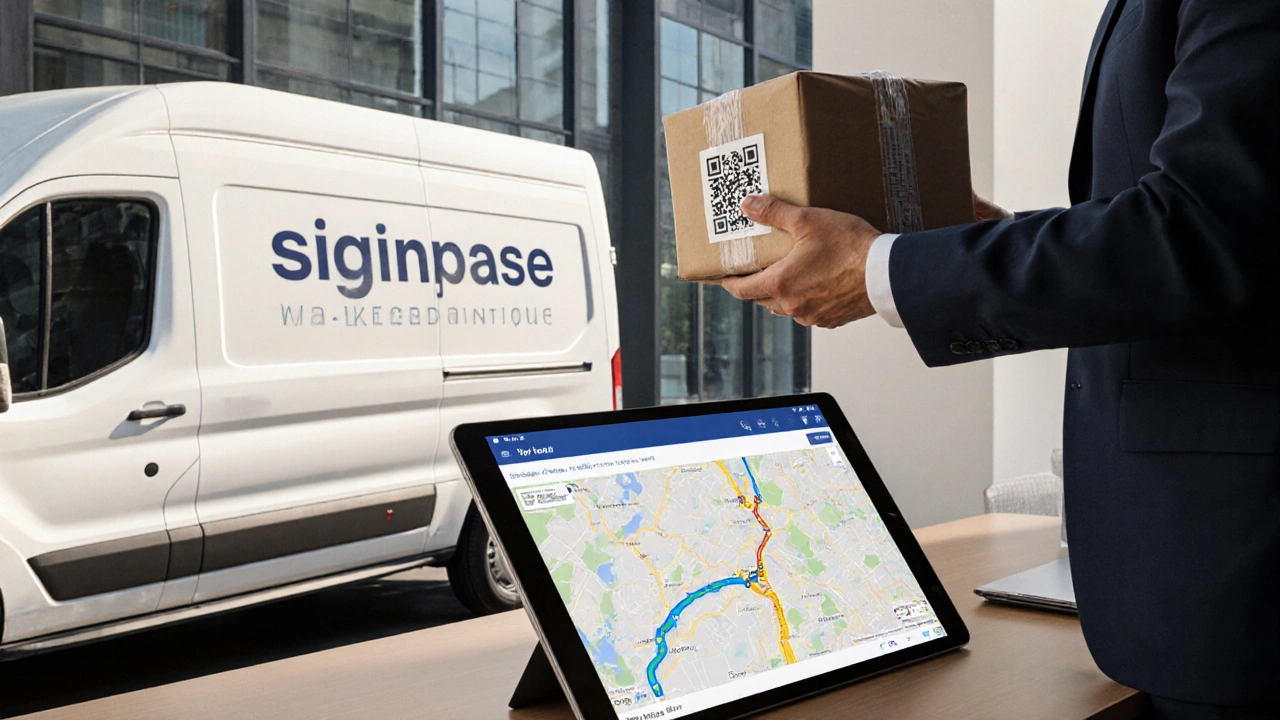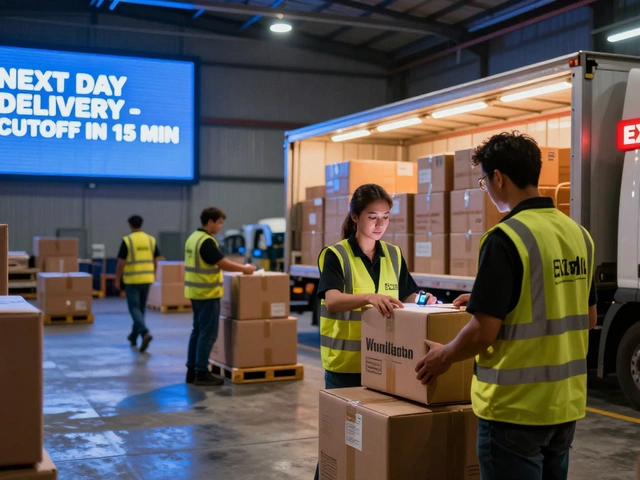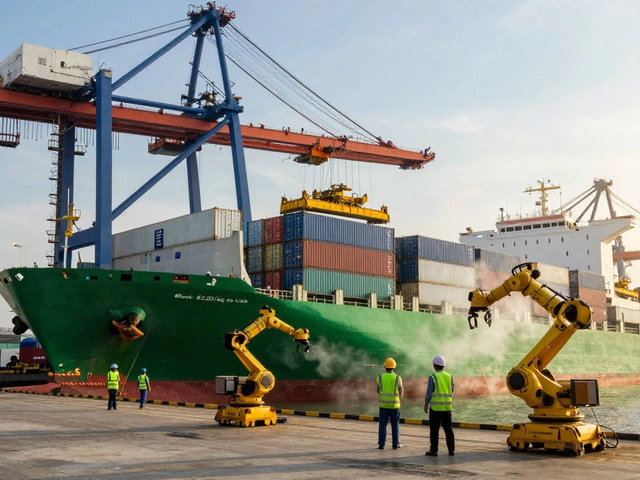Private Courier Cost Estimator
Enter your package details and click "Estimate Shipping Cost"
Key Takeaways
- A private courier service is a dedicated delivery provider that handles parcels for businesses or individuals on a contract basis.
- It offers faster speeds, real‑time tracking, and customized handling compared with regular postal services.
- Pricing depends on distance, weight, service level (same‑day, overnight) and any extra features like insurance.
- Choosing the right courier means matching your shipment’s size, urgency and value with the provider’s capabilities.
- Understanding the contract terms, insurance options and tracking tools helps avoid hidden costs and delays.
When you hear the term Private Courier Service is a specialized delivery operation that transports parcels for a single client or a small group of clients under a direct contract, you might wonder how it differs from the post office you use every day. The short answer: a private courier focuses on speed, reliability and tailored handling, while public postal networks aim for broad coverage at a lower price point. In the next few sections we’ll break down exactly what a private courier does, why many businesses choose it, and how you can decide if it’s the right fit for your next shipment.
What Exactly Is a Private Courier Service?
A private courier service is a courier company that provides dedicated, contract‑based transportation of parcels and freight for a specific client or a limited set of clients. Unlike a public carrier that handles millions of items on an open‑ended schedule, a private courier works with you to design a delivery plan that matches your business rhythms. Whether you need to move a single high‑value package across town or a fleet of pallets to a regional warehouse, the service is built around your needs.
The core components include:
- Parcel - the individual item or collection of items being shipped, often measured by weight and dimensions.
- Delivery - the act of transporting a parcel from the sender’s location to the recipient’s doorstep.
- Logistics - the planning, execution, and control of the parcel’s journey, including route optimization.
- Freight - larger shipments that may require special handling or equipment.
- Tracking - real‑time visibility tools that let you see where your package is at any moment.
- Insurance - optional coverage that protects the value of the parcel against loss or damage.
How It Differs From Public Postal Services
Public postal services like national post offices operate on a massive scale, handling everything from letters to bulk freight. Their strengths lie in extensive networks and lower base rates, but they often lack the flexibility that businesses demand.
Private couriers, on the other hand, give you control over:
- Speed - same‑day, next‑day, or timed‑window deliveries are standard offerings.
- Handling - you can request temperature‑controlled vans, fragile‑item protocols, or secure lock‑boxes.
- Visibility - most private services embed GPS tracking directly into their mobile apps, sending push notifications at each checkpoint.
- Customer Service - dedicated account managers can resolve issues within minutes rather than days.
Because of those benefits, many e‑commerce brands, medical labs, and legal offices opt for private couriers for their most critical shipments.
Key Benefits You’ll Notice
Here’s what you’ll actually feel in day‑to‑day operations when you switch to a private courier:
- Predictable Delivery Windows - clients receive their orders when promised, reducing inquiries and refunds.
- Reduced Damage Rates - specialized handling lowers the chance of dents, breakage, or temperature excursions.
- Real‑Time Tracking - you can watch a parcel move across the city on a live map, which boosts shopper confidence.
- Scalable Services - as your order volume grows, the courier can add more vehicles or drivers without you re‑negotiating contracts.
- Insurance Options - if you ship high‑value items, you can buy coverage that matches the exact declared value, avoiding the low limits of standard postage.
Typical Costs and Pricing Factors
Pricing isn’t a one‑size‑fits‑all figure. Private couriers usually calculate rates based on a mix of these variables:
- Distance - longer routes cost more; some couriers use zone‑based pricing.
- Weight and Size - heavier or bulkier parcels require bigger vehicles or more fuel.
- Service Level - same‑day, overnight, or scheduled window each adds a premium.
- Special Handling - temperature control, fragile care, or hazardous material handling are extra.
- Insurance - coverage is usually priced per $1,000 of declared value.
For example, a 2kg parcel shipped 30km away with same‑day service may cost NZ$25, while the same parcel with standard next‑day service could be NZ$15. Adding insurance for a NZ$2,000 gadget bumps the price up by another NZ$5.
Choosing the Right Private Courier
Not every courier fits every business. Use these criteria to narrow down your options:
- Coverage Area - does the provider serve all your target suburbs or regions?
- Speed Guarantees - can they meet your promised delivery windows?
- Technology Integration - does their tracking API plug into your order management system?
- Pricing Transparency - are all fees (fuel surcharge, after‑hours) clearly listed?
- Customer Support - is there a dedicated account manager or 24/7 hotline?
- Reputation - check industry reviews or ask for client references.
Ask for a trial run with a few low‑value shipments before committing to a long‑term contract. That way you can verify the promised speed and handling quality.

Common Use Cases
Businesses across many sectors rely on private couriers. Here are a few real‑world scenarios:
- E‑commerce retailers - need same‑day delivery for local customers during holiday peaks.
- Medical labs - transport biopsy samples in temperature‑controlled containers within a few hours.
- Legal firms - deliver signed contracts securely and obtain proof of receipt.
- Manufacturers - move critical spare parts to a production line to avoid downtime.
- Event planners - ship décor and equipment to a venue on a tight schedule.
Step‑by‑Step: Setting Up a Private Courier Shipment
- Gather parcel details: weight, dimensions, value, and any special handling needs.
- Log in to the courier’s portal or contact your account manager.
- Enter pickup address, delivery address, and desired service level (same‑day, overnight, etc.).
- Review the quoted price, including insurance and any surcharges.
- Confirm the booking and print the shipping label or attach the electronic manifest.
- Schedule a pickup or drop the parcel at the courier’s hub.
- Track the shipment in real time via the courier’s dashboard; set up email or SMS alerts for key milestones.
- Once delivered, collect proof of delivery (signature, photo) for your records.
Following these steps ensures you avoid missed pickups or surprise fees, and it gives you a clear audit trail for accounting purposes.
Risks and How to Mitigate Them
Even a top‑tier private courier can face hiccups. Here’s how to stay protected:
- Loss or Damage - purchase adequate insurance and request a detailed condition report at pickup.
- Delayed Delivery - choose a courier with a money‑back guarantee for missed windows; keep an alternate carrier on standby for critical shipments.
- Regulatory Issues - verify that the courier complies with local transport regulations, especially for hazardous or medical goods.
- Data Security - ensure the tracking platform uses encryption if you’re sharing customer addresses.
Proactive communication with your account manager can resolve most issues before they affect your customers.
| Feature | Private Courier | National Postal Service |
|---|---|---|
| Delivery Speed | Same‑day, 2‑hour windows, guaranteed | Standard 2‑3 business days, no guarantees |
| Tracking Detail | Real‑time GPS, push notifications | Scan‑at‑hand‑off, limited updates |
| Handling Options | Temperature control, fragile protocol, secure lockers | Basic handling, no special services |
| Insurance Coverage | Customizable up to full parcel value | Low flat‑rate coverage, often insufficient |
| Customer Support | Dedicated account rep, 24/7 hotline | General call centre, longer response times |
| Cost (average per 2kg, 30km) | NZ$25( Same‑day ) / NZ$15( Next‑day ) | NZ$10( Standard ) |
While the national postal service offers the lowest base price, the hidden costs of damage, delays, and poor visibility often outweigh the savings-especially for high‑value or time‑critical shipments.
Frequently Asked Questions
What is the difference between a private courier and a third‑party logistics (3PL) provider?
A private courier focuses solely on transportation and delivery of parcels, often on a contract basis. A 3PL handles broader supply‑chain functions such as warehousing, inventory management, and order fulfillment, in addition to shipping.
Can I use a private courier for international shipments?
Yes, many private couriers have global networks or partnerships with airlines and freight forwarders. However, cross‑border customs paperwork and duties will add complexity and cost.
How is tracking data secured?
Reputable couriers encrypt GPS data in transit and store it on secure servers. Look for providers that comply with industry standards like ISO 27001 or SOC2.
Do private couriers offer same‑day delivery for bulky items?
Many do, using larger vans or trucks that can handle pallets and oversized packages. Pricing will reflect the extra space and handling required.
What should I look for in a courier’s insurance policy?
Check the maximum coverage per shipment, exclusions (e.g., hazardous materials), and whether the policy is provided by the courier or a third‑party insurer. Align the limit with the declared value of your most valuable parcels.
Understanding what a private courier service brings to the table helps you decide when speed, security, and service quality outweigh the lower price of traditional mail. By matching your shipment profile to the right provider, you can keep customers happy, protect valuable goods, and scale your logistics without a headache.





